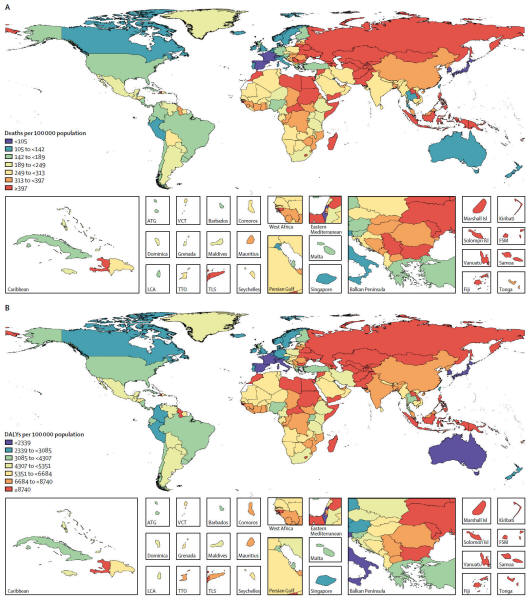|
by Allison Aubrey
for deaths from lifestyle-related diseases in the majority of the world,
according to new research.
As part of a new study (Health effects of Dietary Risks in 195 Countries, 1990-2017) published in The Lancet, researchers analyzed the diets of people in 195 countries using survey data, as well as sales data and household expenditure data.
Then they estimated the impact of poor diets on the risk of death from diseases including heart disease, certain cancers and diabetes.
(They also calculated the number of deaths related to other risk factors, such as smoking and drug use, at the global level.)
Unhealthy diets are,
Which countries do best when it comes to diet?
...were among the countries with the lowest rates of diet-related disease.
The U.S. ranked 43rd, and China ranked 140th.
It should be noted that there were data gaps for intake of key foods in some countries, so some estimates could be off.
And as we've reported,
the Mediterranean pattern of eating
is linked to a reduced risk of heart attacks and memory decline.
The country ranked 57th on the list.
On the one hand, people in Mexico consume a lot of whole grain corn tortillas, he says - and whole grains are beneficial.
But on the other hand,
It's hard to say how the benefits of whole grains may influence the risks of too much sugar, but Afshin says it underscores a problem seen in many countries:
Of course, there are obstacles to eating well, including access and affordability.
As the
Trump
administration and U.S. lawmakers debate whether able-bodied people
who don't work should be entitled to public food assistance, it's
clear that many people around the globe struggle to afford healthy
foods.
...it's important to remember that hunger and obesity are both forms of malnutrition. And the costs are staggering...
Consider a recent report from the Center for Strategic and International Studies, which notes:
Globally, these findings may serve as a reminder that when it comes to ending hunger and improving health, people don't just need food. They need nourishment.
If you fill up on a diet
of packaged snacks made from refined-carbohydrates and sugary sodas,
you may get the calories you need, but those calories will put you
on a path toward disease.
A recent study (When Too Much isn't Enough - Does current Food Production meet Global Nutritional Needs?) published in the journal PLOS One by researchers at the University of Guelph found that there would not be enough fruit and vegetables to go around.
Evan Fraser says we produce too much fat, too much sugar and too many starchy products.
So, food companies and farmers play a role, too.
Perhaps that's why the authors of the new Lancet study say their findings point to the need for coordinated, global efforts.
Improving diets won't be easy:
|



